UNIT 503 Report: Kennedy, Analysis of Education and Training Practices
VerifiedAdded on 2022/09/16
|23
|5839
|22
Report
AI Summary
This report, prepared by Kennedy, provides a detailed analysis of education and training, focusing on professionalism, educational policies, and stakeholder roles. Task A explores the introduction of professionalism in education and training, the influence of professional values, and factors shaping educational policies (social, political, and economic), and the key aspects of an organization including policies, codes of practice, and guidelines. Task B presents a case study, examining the roles of stakeholders and external bodies, accountability, and the importance of collaboration with employers. Task C delves into current educational policies on curriculum, the impact of stakeholder accountability, and the influence of organizational requirements. Finally, Task D offers an analytical report on quality improvement, self-assessment, and areas for personal and overall improvement. The report emphasizes the importance of stakeholder engagement, policy adherence, and continuous improvement in education and training practices, with a focus on music education as a practice area.
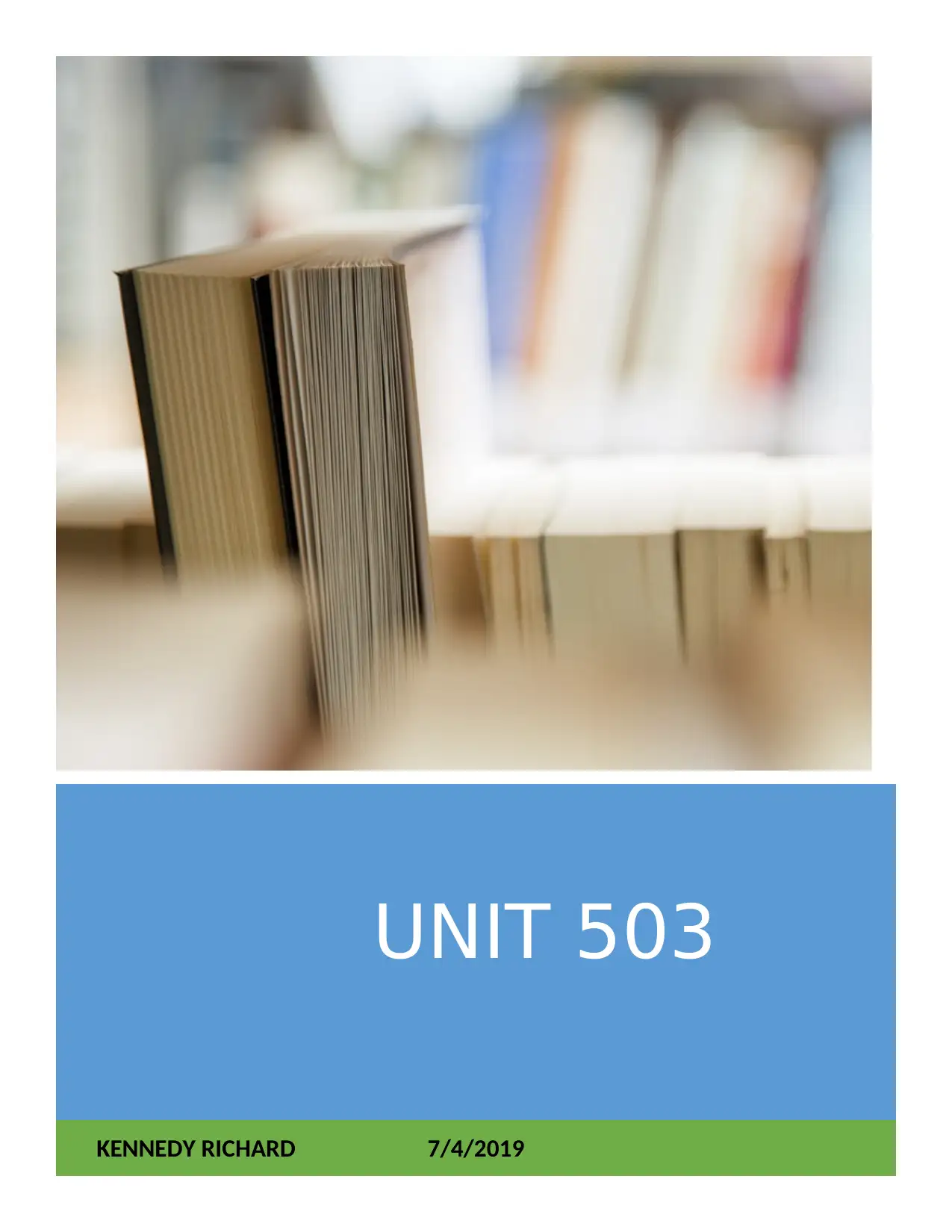
UNIT 503
KENNEDY RICHARD 7/4/2019
KENNEDY RICHARD 7/4/2019
Paraphrase This Document
Need a fresh take? Get an instant paraphrase of this document with our AI Paraphraser
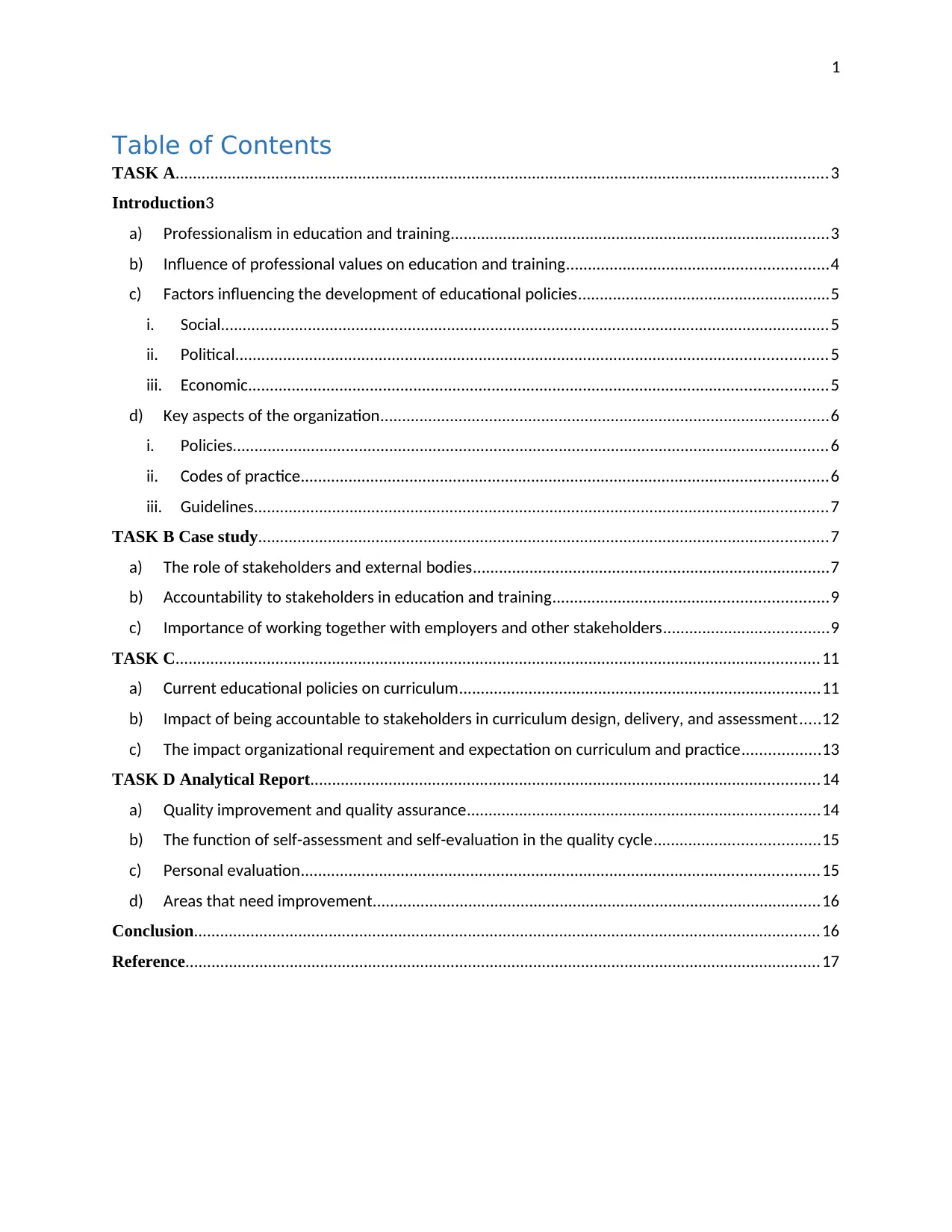
1
Table of Contents
TASK A......................................................................................................................................................3
Introduction3
a) Professionalism in education and training.......................................................................................3
b) Influence of professional values on education and training............................................................4
c) Factors influencing the development of educational policies..........................................................5
i. Social............................................................................................................................................5
ii. Political........................................................................................................................................5
iii. Economic.....................................................................................................................................5
d) Key aspects of the organization.......................................................................................................6
i. Policies.........................................................................................................................................6
ii. Codes of practice.........................................................................................................................6
iii. Guidelines....................................................................................................................................7
TASK B Case study...................................................................................................................................7
a) The role of stakeholders and external bodies..................................................................................7
b) Accountability to stakeholders in education and training...............................................................9
c) Importance of working together with employers and other stakeholders......................................9
TASK C....................................................................................................................................................11
a) Current educational policies on curriculum...................................................................................11
b) Impact of being accountable to stakeholders in curriculum design, delivery, and assessment.....12
c) The impact organizational requirement and expectation on curriculum and practice..................13
TASK D Analytical Report.....................................................................................................................14
a) Quality improvement and quality assurance.................................................................................14
b) The function of self-assessment and self-evaluation in the quality cycle......................................15
c) Personal evaluation.......................................................................................................................15
d) Areas that need improvement.......................................................................................................16
Conclusion................................................................................................................................................16
Reference..................................................................................................................................................17
Table of Contents
TASK A......................................................................................................................................................3
Introduction3
a) Professionalism in education and training.......................................................................................3
b) Influence of professional values on education and training............................................................4
c) Factors influencing the development of educational policies..........................................................5
i. Social............................................................................................................................................5
ii. Political........................................................................................................................................5
iii. Economic.....................................................................................................................................5
d) Key aspects of the organization.......................................................................................................6
i. Policies.........................................................................................................................................6
ii. Codes of practice.........................................................................................................................6
iii. Guidelines....................................................................................................................................7
TASK B Case study...................................................................................................................................7
a) The role of stakeholders and external bodies..................................................................................7
b) Accountability to stakeholders in education and training...............................................................9
c) Importance of working together with employers and other stakeholders......................................9
TASK C....................................................................................................................................................11
a) Current educational policies on curriculum...................................................................................11
b) Impact of being accountable to stakeholders in curriculum design, delivery, and assessment.....12
c) The impact organizational requirement and expectation on curriculum and practice..................13
TASK D Analytical Report.....................................................................................................................14
a) Quality improvement and quality assurance.................................................................................14
b) The function of self-assessment and self-evaluation in the quality cycle......................................15
c) Personal evaluation.......................................................................................................................15
d) Areas that need improvement.......................................................................................................16
Conclusion................................................................................................................................................16
Reference..................................................................................................................................................17
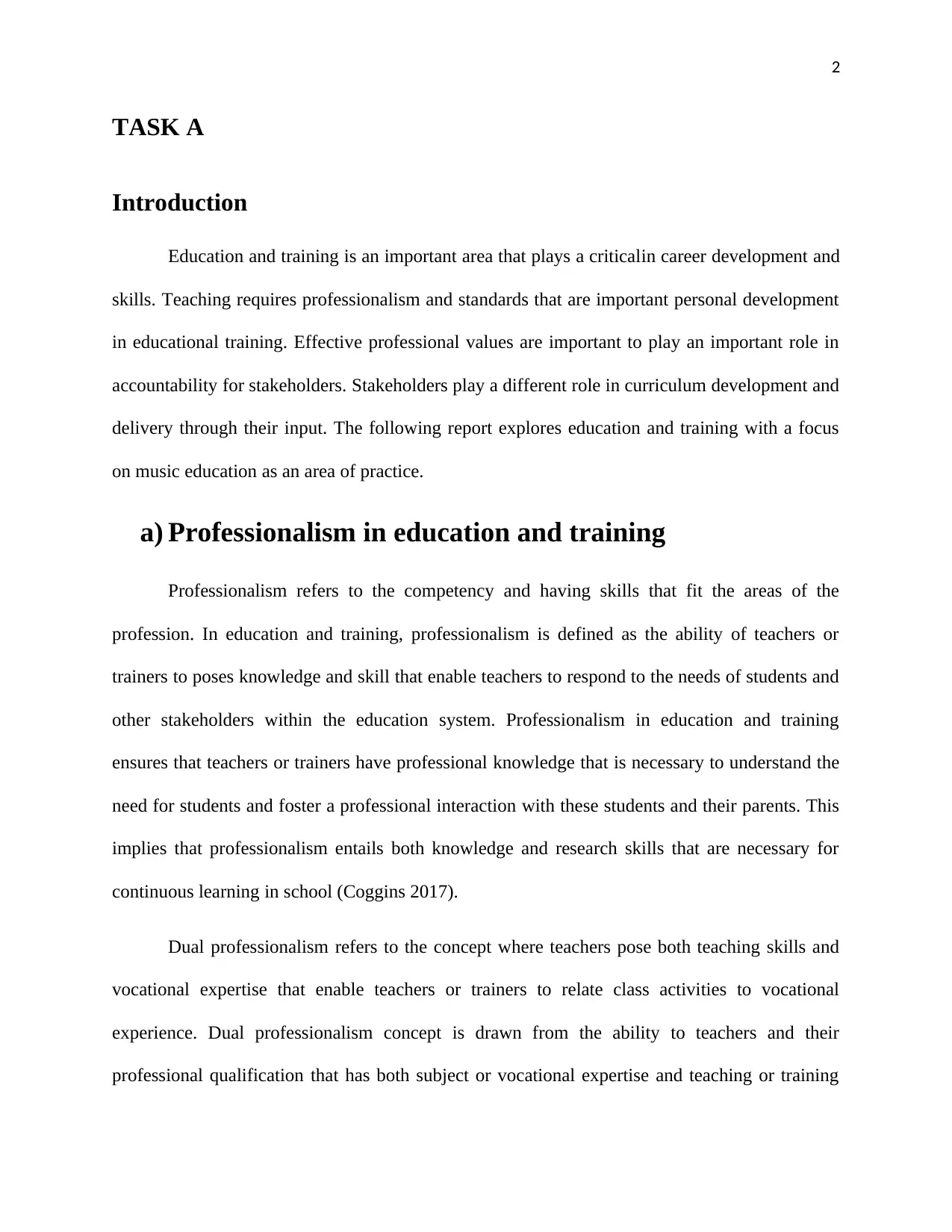
2
TASK A
Introduction
Education and training is an important area that plays a criticalin career development and
skills. Teaching requires professionalism and standards that are important personal development
in educational training. Effective professional values are important to play an important role in
accountability for stakeholders. Stakeholders play a different role in curriculum development and
delivery through their input. The following report explores education and training with a focus
on music education as an area of practice.
a) Professionalism in education and training
Professionalism refers to the competency and having skills that fit the areas of the
profession. In education and training, professionalism is defined as the ability of teachers or
trainers to poses knowledge and skill that enable teachers to respond to the needs of students and
other stakeholders within the education system. Professionalism in education and training
ensures that teachers or trainers have professional knowledge that is necessary to understand the
need for students and foster a professional interaction with these students and their parents. This
implies that professionalism entails both knowledge and research skills that are necessary for
continuous learning in school (Coggins 2017).
Dual professionalism refers to the concept where teachers pose both teaching skills and
vocational expertise that enable teachers or trainers to relate class activities to vocational
experience. Dual professionalism concept is drawn from the ability to teachers and their
professional qualification that has both subject or vocational expertise and teaching or training
TASK A
Introduction
Education and training is an important area that plays a criticalin career development and
skills. Teaching requires professionalism and standards that are important personal development
in educational training. Effective professional values are important to play an important role in
accountability for stakeholders. Stakeholders play a different role in curriculum development and
delivery through their input. The following report explores education and training with a focus
on music education as an area of practice.
a) Professionalism in education and training
Professionalism refers to the competency and having skills that fit the areas of the
profession. In education and training, professionalism is defined as the ability of teachers or
trainers to poses knowledge and skill that enable teachers to respond to the needs of students and
other stakeholders within the education system. Professionalism in education and training
ensures that teachers or trainers have professional knowledge that is necessary to understand the
need for students and foster a professional interaction with these students and their parents. This
implies that professionalism entails both knowledge and research skills that are necessary for
continuous learning in school (Coggins 2017).
Dual professionalism refers to the concept where teachers pose both teaching skills and
vocational expertise that enable teachers or trainers to relate class activities to vocational
experience. Dual professionalism concept is drawn from the ability to teachers and their
professional qualification that has both subject or vocational expertise and teaching or training
⊘ This is a preview!⊘
Do you want full access?
Subscribe today to unlock all pages.

Trusted by 1+ million students worldwide
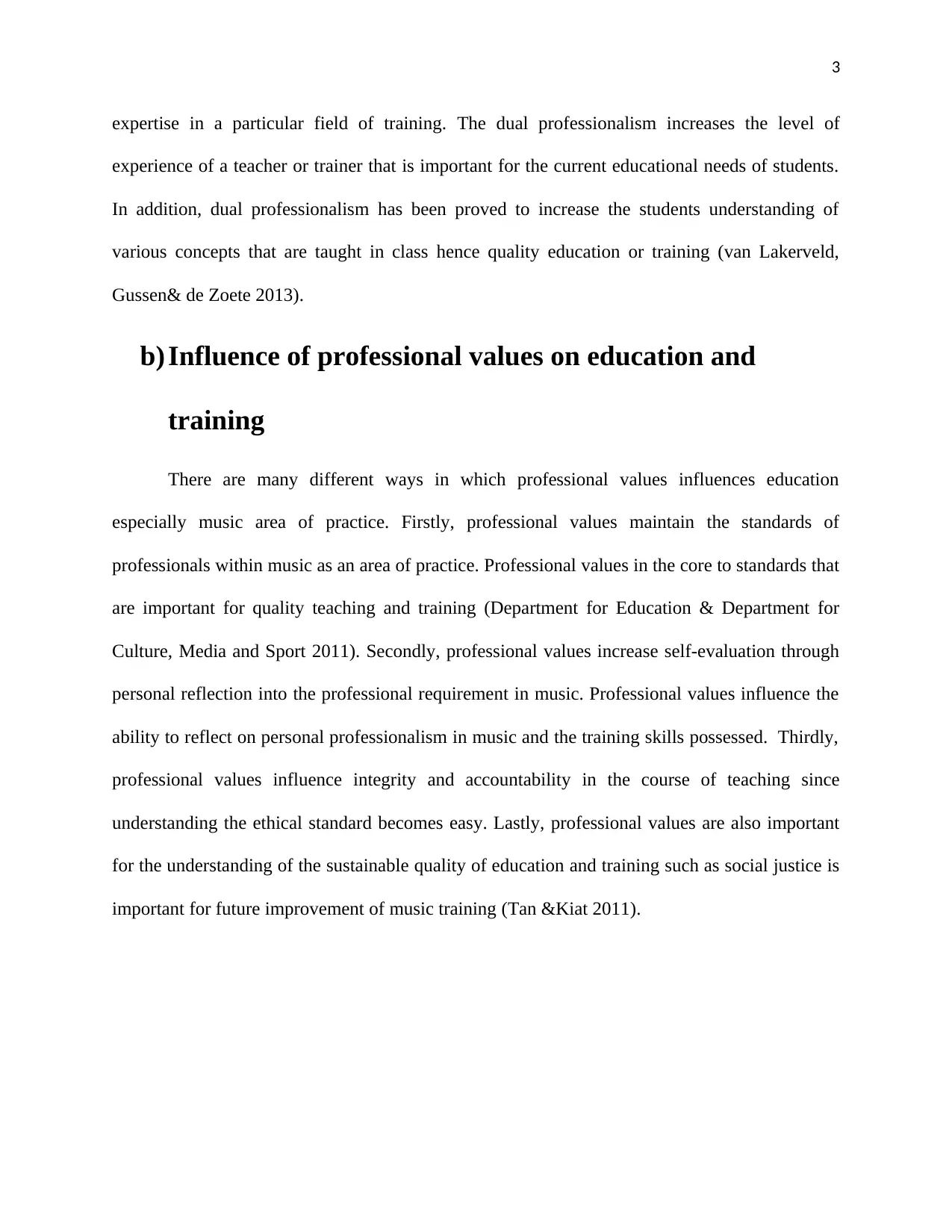
3
expertise in a particular field of training. The dual professionalism increases the level of
experience of a teacher or trainer that is important for the current educational needs of students.
In addition, dual professionalism has been proved to increase the students understanding of
various concepts that are taught in class hence quality education or training (van Lakerveld,
Gussen& de Zoete 2013).
b) Influence of professional values on education and
training
There are many different ways in which professional values influences education
especially music area of practice. Firstly, professional values maintain the standards of
professionals within music as an area of practice. Professional values in the core to standards that
are important for quality teaching and training (Department for Education & Department for
Culture, Media and Sport 2011). Secondly, professional values increase self-evaluation through
personal reflection into the professional requirement in music. Professional values influence the
ability to reflect on personal professionalism in music and the training skills possessed. Thirdly,
professional values influence integrity and accountability in the course of teaching since
understanding the ethical standard becomes easy. Lastly, professional values are also important
for the understanding of the sustainable quality of education and training such as social justice is
important for future improvement of music training (Tan &Kiat 2011).
expertise in a particular field of training. The dual professionalism increases the level of
experience of a teacher or trainer that is important for the current educational needs of students.
In addition, dual professionalism has been proved to increase the students understanding of
various concepts that are taught in class hence quality education or training (van Lakerveld,
Gussen& de Zoete 2013).
b) Influence of professional values on education and
training
There are many different ways in which professional values influences education
especially music area of practice. Firstly, professional values maintain the standards of
professionals within music as an area of practice. Professional values in the core to standards that
are important for quality teaching and training (Department for Education & Department for
Culture, Media and Sport 2011). Secondly, professional values increase self-evaluation through
personal reflection into the professional requirement in music. Professional values influence the
ability to reflect on personal professionalism in music and the training skills possessed. Thirdly,
professional values influence integrity and accountability in the course of teaching since
understanding the ethical standard becomes easy. Lastly, professional values are also important
for the understanding of the sustainable quality of education and training such as social justice is
important for future improvement of music training (Tan &Kiat 2011).
Paraphrase This Document
Need a fresh take? Get an instant paraphrase of this document with our AI Paraphraser
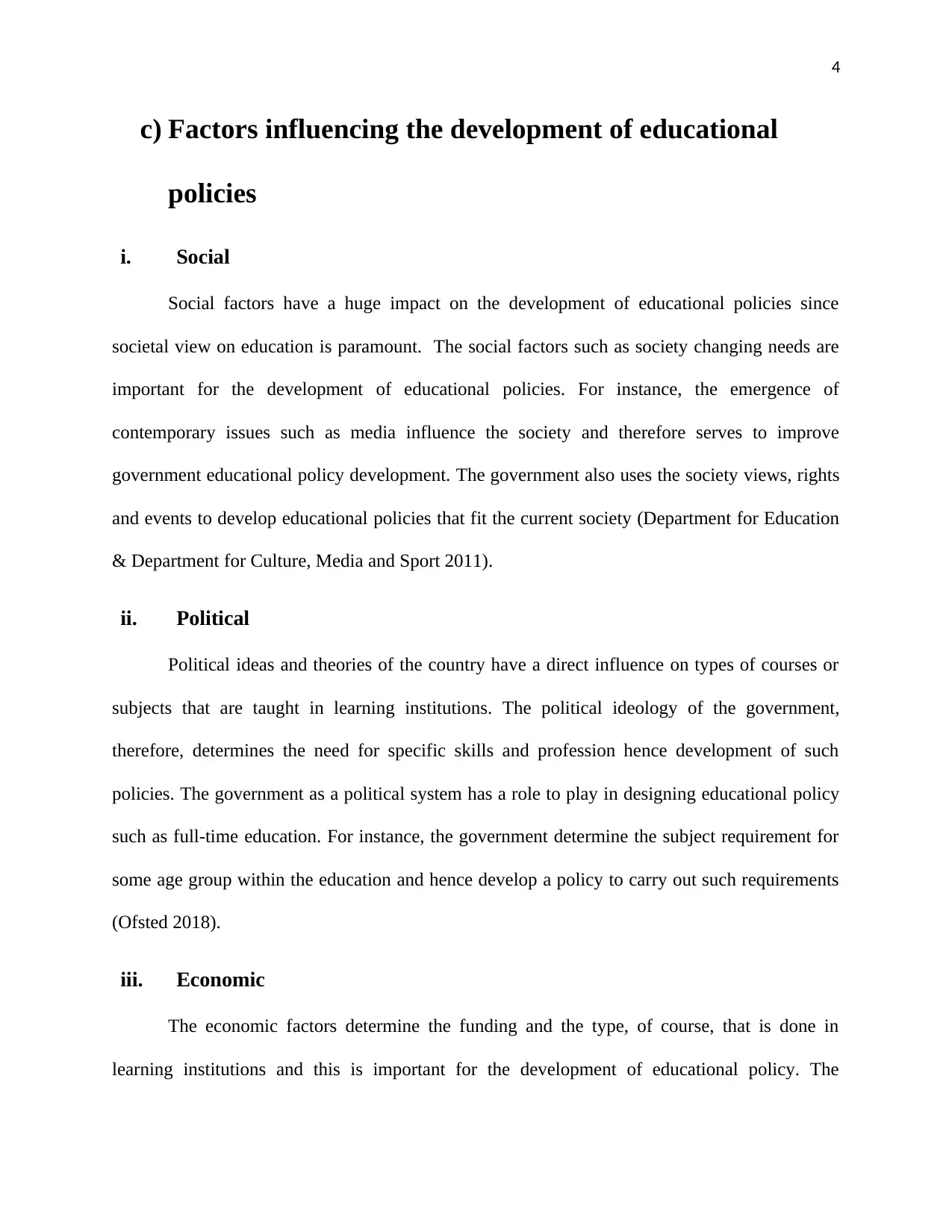
4
c) Factors influencing the development of educational
policies
i. Social
Social factors have a huge impact on the development of educational policies since
societal view on education is paramount. The social factors such as society changing needs are
important for the development of educational policies. For instance, the emergence of
contemporary issues such as media influence the society and therefore serves to improve
government educational policy development. The government also uses the society views, rights
and events to develop educational policies that fit the current society (Department for Education
& Department for Culture, Media and Sport 2011).
ii. Political
Political ideas and theories of the country have a direct influence on types of courses or
subjects that are taught in learning institutions. The political ideology of the government,
therefore, determines the need for specific skills and profession hence development of such
policies. The government as a political system has a role to play in designing educational policy
such as full-time education. For instance, the government determine the subject requirement for
some age group within the education and hence develop a policy to carry out such requirements
(Ofsted 2018).
iii. Economic
The economic factors determine the funding and the type, of course, that is done in
learning institutions and this is important for the development of educational policy. The
c) Factors influencing the development of educational
policies
i. Social
Social factors have a huge impact on the development of educational policies since
societal view on education is paramount. The social factors such as society changing needs are
important for the development of educational policies. For instance, the emergence of
contemporary issues such as media influence the society and therefore serves to improve
government educational policy development. The government also uses the society views, rights
and events to develop educational policies that fit the current society (Department for Education
& Department for Culture, Media and Sport 2011).
ii. Political
Political ideas and theories of the country have a direct influence on types of courses or
subjects that are taught in learning institutions. The political ideology of the government,
therefore, determines the need for specific skills and profession hence development of such
policies. The government as a political system has a role to play in designing educational policy
such as full-time education. For instance, the government determine the subject requirement for
some age group within the education and hence develop a policy to carry out such requirements
(Ofsted 2018).
iii. Economic
The economic factors determine the funding and the type, of course, that is done in
learning institutions and this is important for the development of educational policy. The
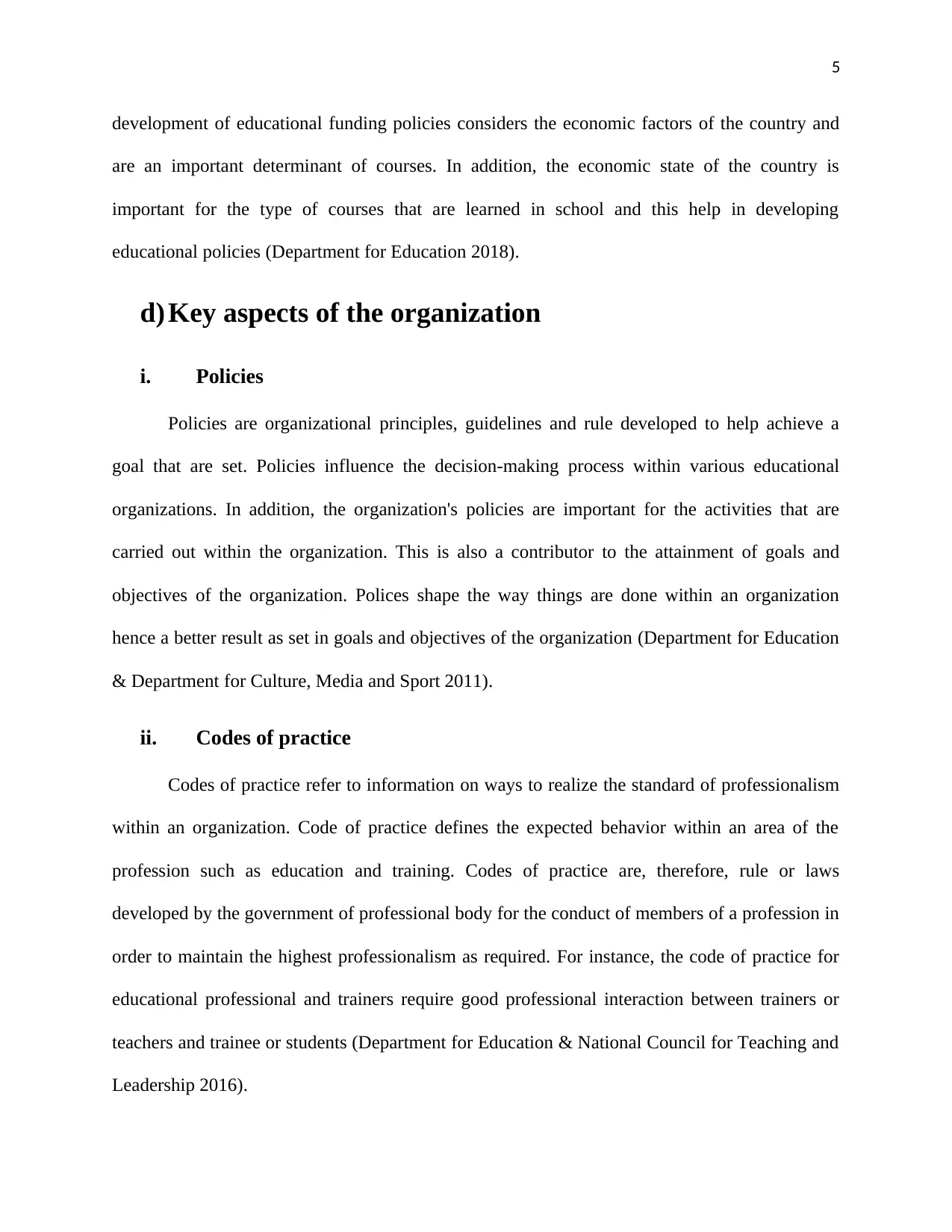
5
development of educational funding policies considers the economic factors of the country and
are an important determinant of courses. In addition, the economic state of the country is
important for the type of courses that are learned in school and this help in developing
educational policies (Department for Education 2018).
d) Key aspects of the organization
i. Policies
Policies are organizational principles, guidelines and rule developed to help achieve a
goal that are set. Policies influence the decision-making process within various educational
organizations. In addition, the organization's policies are important for the activities that are
carried out within the organization. This is also a contributor to the attainment of goals and
objectives of the organization. Polices shape the way things are done within an organization
hence a better result as set in goals and objectives of the organization (Department for Education
& Department for Culture, Media and Sport 2011).
ii. Codes of practice
Codes of practice refer to information on ways to realize the standard of professionalism
within an organization. Code of practice defines the expected behavior within an area of the
profession such as education and training. Codes of practice are, therefore, rule or laws
developed by the government of professional body for the conduct of members of a profession in
order to maintain the highest professionalism as required. For instance, the code of practice for
educational professional and trainers require good professional interaction between trainers or
teachers and trainee or students (Department for Education & National Council for Teaching and
Leadership 2016).
development of educational funding policies considers the economic factors of the country and
are an important determinant of courses. In addition, the economic state of the country is
important for the type of courses that are learned in school and this help in developing
educational policies (Department for Education 2018).
d) Key aspects of the organization
i. Policies
Policies are organizational principles, guidelines and rule developed to help achieve a
goal that are set. Policies influence the decision-making process within various educational
organizations. In addition, the organization's policies are important for the activities that are
carried out within the organization. This is also a contributor to the attainment of goals and
objectives of the organization. Polices shape the way things are done within an organization
hence a better result as set in goals and objectives of the organization (Department for Education
& Department for Culture, Media and Sport 2011).
ii. Codes of practice
Codes of practice refer to information on ways to realize the standard of professionalism
within an organization. Code of practice defines the expected behavior within an area of the
profession such as education and training. Codes of practice are, therefore, rule or laws
developed by the government of professional body for the conduct of members of a profession in
order to maintain the highest professionalism as required. For instance, the code of practice for
educational professional and trainers require good professional interaction between trainers or
teachers and trainee or students (Department for Education & National Council for Teaching and
Leadership 2016).
⊘ This is a preview!⊘
Do you want full access?
Subscribe today to unlock all pages.

Trusted by 1+ million students worldwide
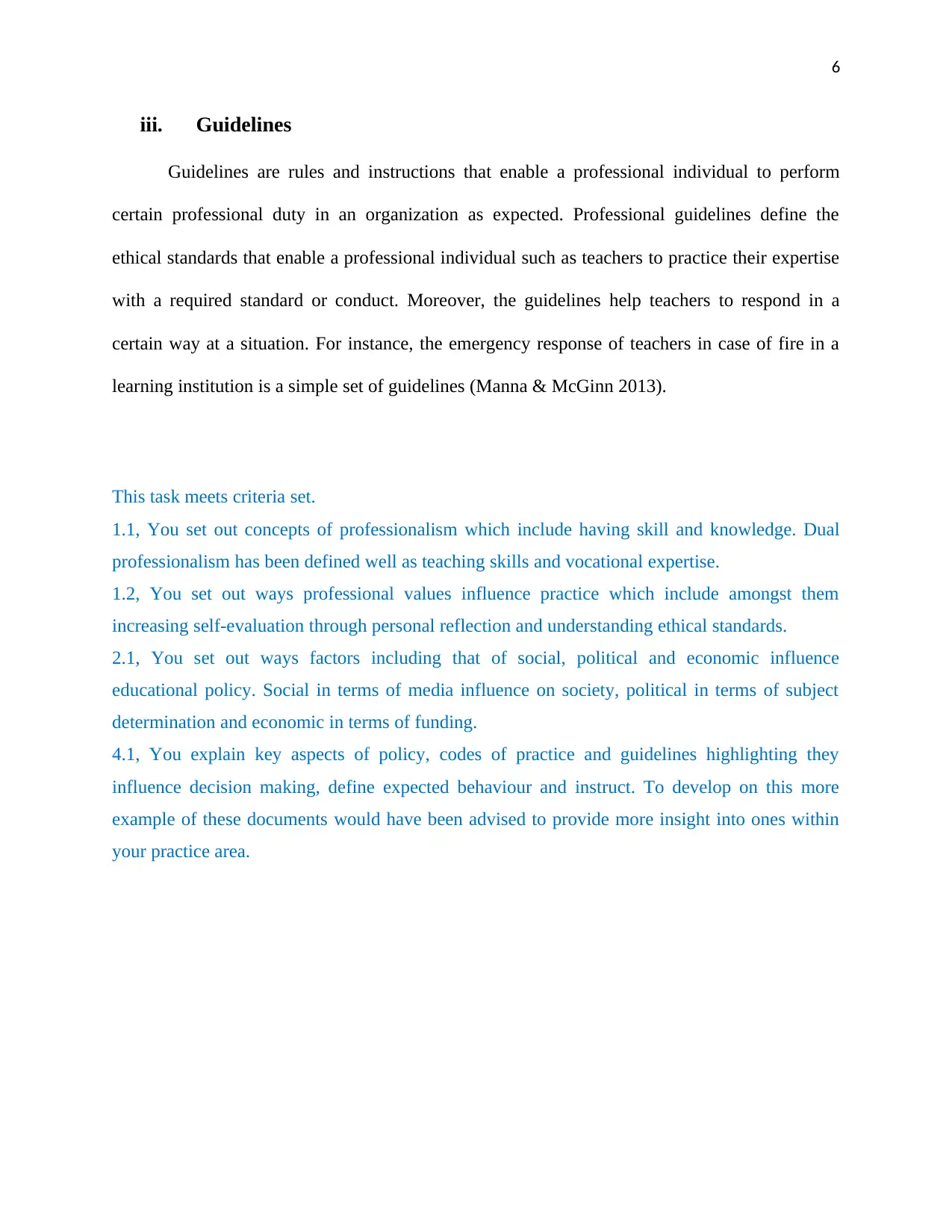
6
iii. Guidelines
Guidelines are rules and instructions that enable a professional individual to perform
certain professional duty in an organization as expected. Professional guidelines define the
ethical standards that enable a professional individual such as teachers to practice their expertise
with a required standard or conduct. Moreover, the guidelines help teachers to respond in a
certain way at a situation. For instance, the emergency response of teachers in case of fire in a
learning institution is a simple set of guidelines (Manna & McGinn 2013).
This task meets criteria set.
1.1, You set out concepts of professionalism which include having skill and knowledge. Dual
professionalism has been defined well as teaching skills and vocational expertise.
1.2, You set out ways professional values influence practice which include amongst them
increasing self-evaluation through personal reflection and understanding ethical standards.
2.1, You set out ways factors including that of social, political and economic influence
educational policy. Social in terms of media influence on society, political in terms of subject
determination and economic in terms of funding.
4.1, You explain key aspects of policy, codes of practice and guidelines highlighting they
influence decision making, define expected behaviour and instruct. To develop on this more
example of these documents would have been advised to provide more insight into ones within
your practice area.
iii. Guidelines
Guidelines are rules and instructions that enable a professional individual to perform
certain professional duty in an organization as expected. Professional guidelines define the
ethical standards that enable a professional individual such as teachers to practice their expertise
with a required standard or conduct. Moreover, the guidelines help teachers to respond in a
certain way at a situation. For instance, the emergency response of teachers in case of fire in a
learning institution is a simple set of guidelines (Manna & McGinn 2013).
This task meets criteria set.
1.1, You set out concepts of professionalism which include having skill and knowledge. Dual
professionalism has been defined well as teaching skills and vocational expertise.
1.2, You set out ways professional values influence practice which include amongst them
increasing self-evaluation through personal reflection and understanding ethical standards.
2.1, You set out ways factors including that of social, political and economic influence
educational policy. Social in terms of media influence on society, political in terms of subject
determination and economic in terms of funding.
4.1, You explain key aspects of policy, codes of practice and guidelines highlighting they
influence decision making, define expected behaviour and instruct. To develop on this more
example of these documents would have been advised to provide more insight into ones within
your practice area.
Paraphrase This Document
Need a fresh take? Get an instant paraphrase of this document with our AI Paraphraser
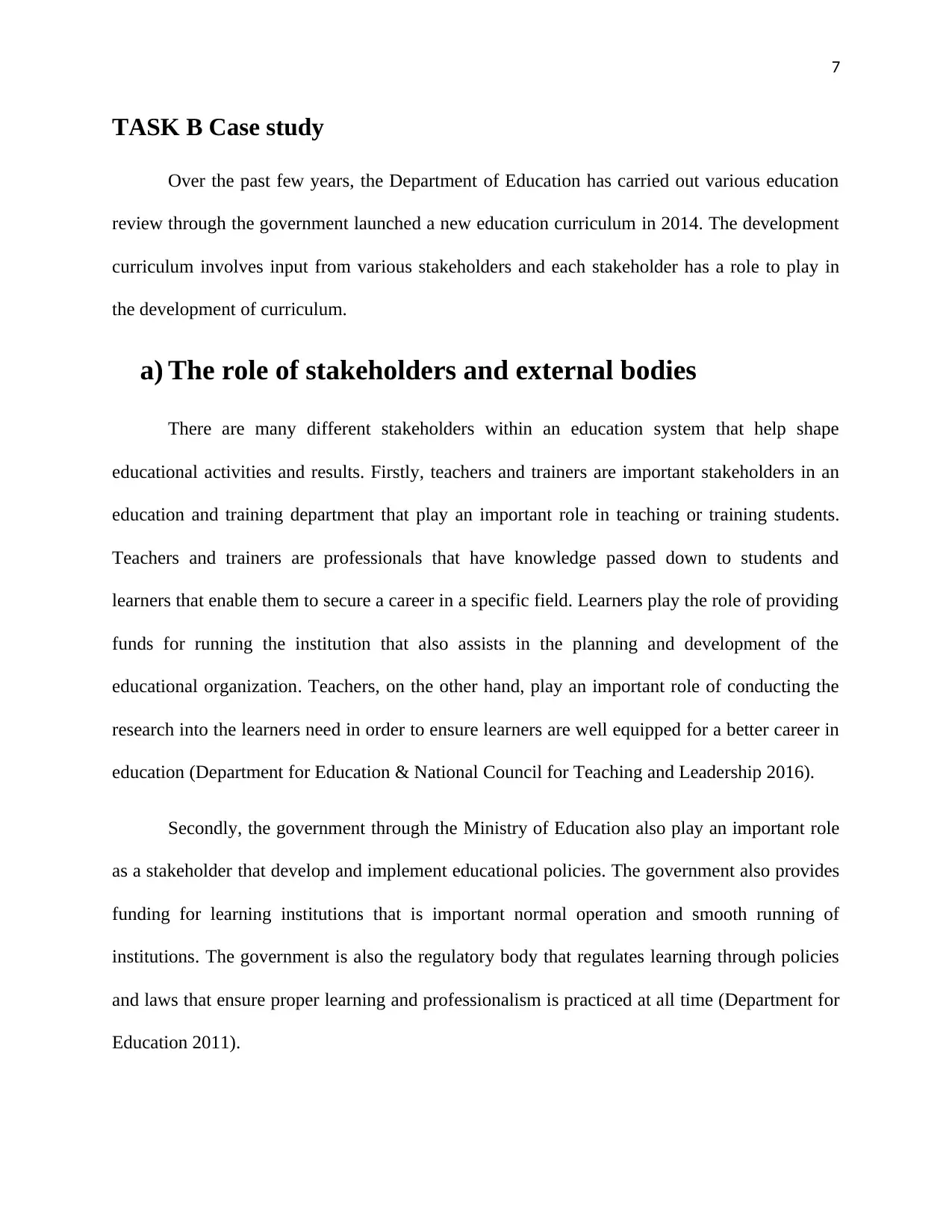
7
TASK B Case study
Over the past few years, the Department of Education has carried out various education
review through the government launched a new education curriculum in 2014. The development
curriculum involves input from various stakeholders and each stakeholder has a role to play in
the development of curriculum.
a) The role of stakeholders and external bodies
There are many different stakeholders within an education system that help shape
educational activities and results. Firstly, teachers and trainers are important stakeholders in an
education and training department that play an important role in teaching or training students.
Teachers and trainers are professionals that have knowledge passed down to students and
learners that enable them to secure a career in a specific field. Learners play the role of providing
funds for running the institution that also assists in the planning and development of the
educational organization. Teachers, on the other hand, play an important role of conducting the
research into the learners need in order to ensure learners are well equipped for a better career in
education (Department for Education & National Council for Teaching and Leadership 2016).
Secondly, the government through the Ministry of Education also play an important role
as a stakeholder that develop and implement educational policies. The government also provides
funding for learning institutions that is important normal operation and smooth running of
institutions. The government is also the regulatory body that regulates learning through policies
and laws that ensure proper learning and professionalism is practiced at all time (Department for
Education 2011).
TASK B Case study
Over the past few years, the Department of Education has carried out various education
review through the government launched a new education curriculum in 2014. The development
curriculum involves input from various stakeholders and each stakeholder has a role to play in
the development of curriculum.
a) The role of stakeholders and external bodies
There are many different stakeholders within an education system that help shape
educational activities and results. Firstly, teachers and trainers are important stakeholders in an
education and training department that play an important role in teaching or training students.
Teachers and trainers are professionals that have knowledge passed down to students and
learners that enable them to secure a career in a specific field. Learners play the role of providing
funds for running the institution that also assists in the planning and development of the
educational organization. Teachers, on the other hand, play an important role of conducting the
research into the learners need in order to ensure learners are well equipped for a better career in
education (Department for Education & National Council for Teaching and Leadership 2016).
Secondly, the government through the Ministry of Education also play an important role
as a stakeholder that develop and implement educational policies. The government also provides
funding for learning institutions that is important normal operation and smooth running of
institutions. The government is also the regulatory body that regulates learning through policies
and laws that ensure proper learning and professionalism is practiced at all time (Department for
Education 2011).
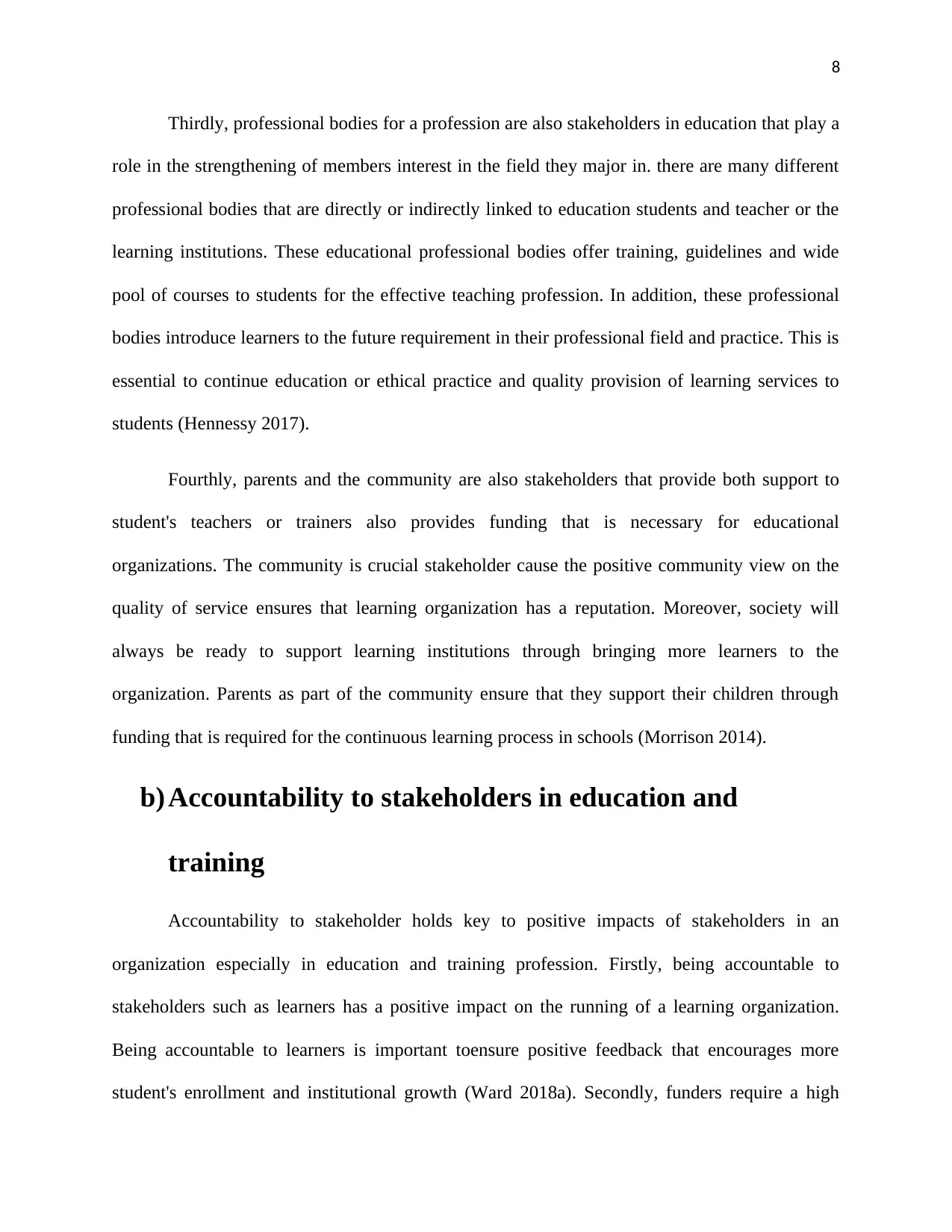
8
Thirdly, professional bodies for a profession are also stakeholders in education that play a
role in the strengthening of members interest in the field they major in. there are many different
professional bodies that are directly or indirectly linked to education students and teacher or the
learning institutions. These educational professional bodies offer training, guidelines and wide
pool of courses to students for the effective teaching profession. In addition, these professional
bodies introduce learners to the future requirement in their professional field and practice. This is
essential to continue education or ethical practice and quality provision of learning services to
students (Hennessy 2017).
Fourthly, parents and the community are also stakeholders that provide both support to
student's teachers or trainers also provides funding that is necessary for educational
organizations. The community is crucial stakeholder cause the positive community view on the
quality of service ensures that learning organization has a reputation. Moreover, society will
always be ready to support learning institutions through bringing more learners to the
organization. Parents as part of the community ensure that they support their children through
funding that is required for the continuous learning process in schools (Morrison 2014).
b) Accountability to stakeholders in education and
training
Accountability to stakeholder holds key to positive impacts of stakeholders in an
organization especially in education and training profession. Firstly, being accountable to
stakeholders such as learners has a positive impact on the running of a learning organization.
Being accountable to learners is important toensure positive feedback that encourages more
student's enrollment and institutional growth (Ward 2018a). Secondly, funders require a high
Thirdly, professional bodies for a profession are also stakeholders in education that play a
role in the strengthening of members interest in the field they major in. there are many different
professional bodies that are directly or indirectly linked to education students and teacher or the
learning institutions. These educational professional bodies offer training, guidelines and wide
pool of courses to students for the effective teaching profession. In addition, these professional
bodies introduce learners to the future requirement in their professional field and practice. This is
essential to continue education or ethical practice and quality provision of learning services to
students (Hennessy 2017).
Fourthly, parents and the community are also stakeholders that provide both support to
student's teachers or trainers also provides funding that is necessary for educational
organizations. The community is crucial stakeholder cause the positive community view on the
quality of service ensures that learning organization has a reputation. Moreover, society will
always be ready to support learning institutions through bringing more learners to the
organization. Parents as part of the community ensure that they support their children through
funding that is required for the continuous learning process in schools (Morrison 2014).
b) Accountability to stakeholders in education and
training
Accountability to stakeholder holds key to positive impacts of stakeholders in an
organization especially in education and training profession. Firstly, being accountable to
stakeholders such as learners has a positive impact on the running of a learning organization.
Being accountable to learners is important toensure positive feedback that encourages more
student's enrollment and institutional growth (Ward 2018a). Secondly, funders require a high
⊘ This is a preview!⊘
Do you want full access?
Subscribe today to unlock all pages.

Trusted by 1+ million students worldwide
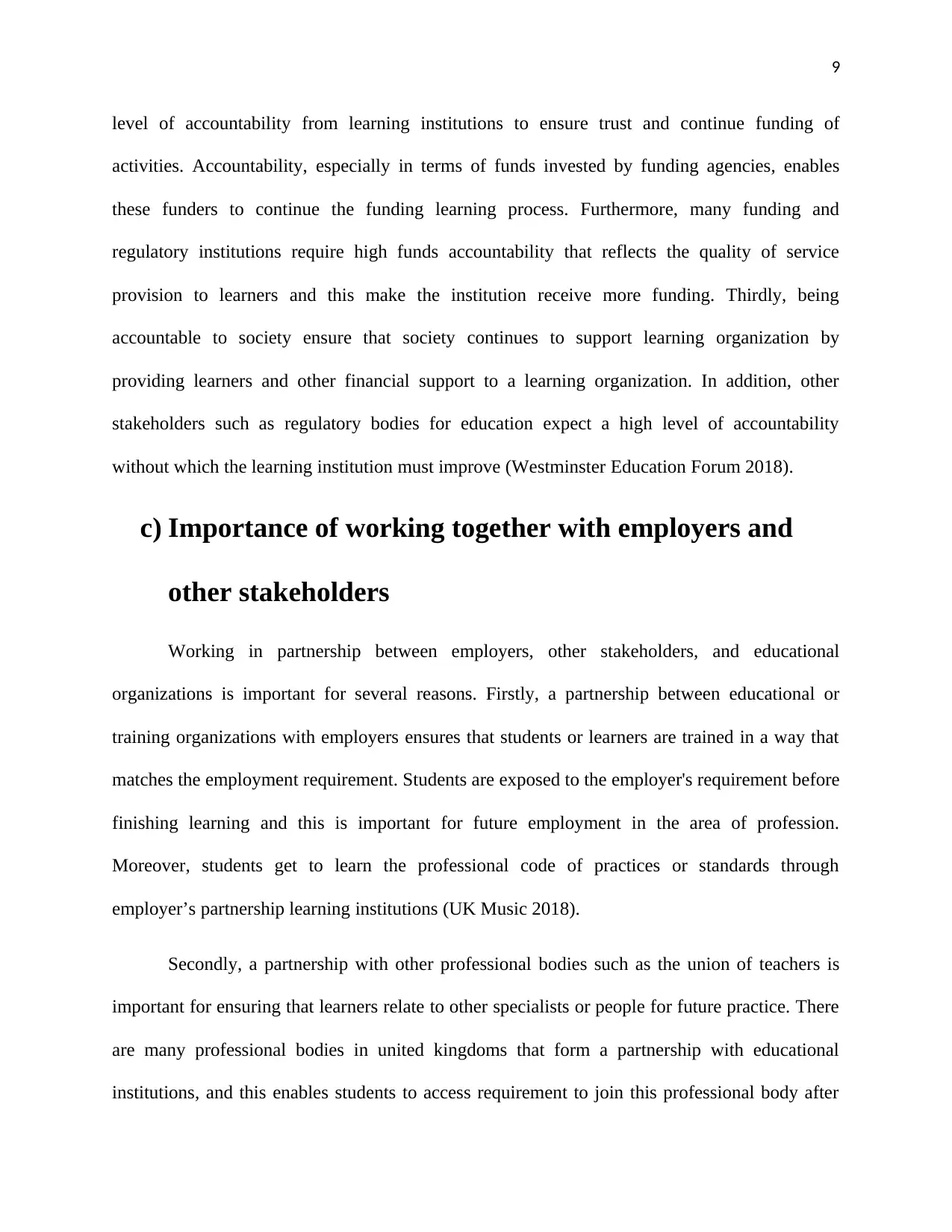
9
level of accountability from learning institutions to ensure trust and continue funding of
activities. Accountability, especially in terms of funds invested by funding agencies, enables
these funders to continue the funding learning process. Furthermore, many funding and
regulatory institutions require high funds accountability that reflects the quality of service
provision to learners and this make the institution receive more funding. Thirdly, being
accountable to society ensure that society continues to support learning organization by
providing learners and other financial support to a learning organization. In addition, other
stakeholders such as regulatory bodies for education expect a high level of accountability
without which the learning institution must improve (Westminster Education Forum 2018).
c) Importance of working together with employers and
other stakeholders
Working in partnership between employers, other stakeholders, and educational
organizations is important for several reasons. Firstly, a partnership between educational or
training organizations with employers ensures that students or learners are trained in a way that
matches the employment requirement. Students are exposed to the employer's requirement before
finishing learning and this is important for future employment in the area of profession.
Moreover, students get to learn the professional code of practices or standards through
employer’s partnership learning institutions (UK Music 2018).
Secondly, a partnership with other professional bodies such as the union of teachers is
important for ensuring that learners relate to other specialists or people for future practice. There
are many professional bodies in united kingdoms that form a partnership with educational
institutions, and this enables students to access requirement to join this professional body after
level of accountability from learning institutions to ensure trust and continue funding of
activities. Accountability, especially in terms of funds invested by funding agencies, enables
these funders to continue the funding learning process. Furthermore, many funding and
regulatory institutions require high funds accountability that reflects the quality of service
provision to learners and this make the institution receive more funding. Thirdly, being
accountable to society ensure that society continues to support learning organization by
providing learners and other financial support to a learning organization. In addition, other
stakeholders such as regulatory bodies for education expect a high level of accountability
without which the learning institution must improve (Westminster Education Forum 2018).
c) Importance of working together with employers and
other stakeholders
Working in partnership between employers, other stakeholders, and educational
organizations is important for several reasons. Firstly, a partnership between educational or
training organizations with employers ensures that students or learners are trained in a way that
matches the employment requirement. Students are exposed to the employer's requirement before
finishing learning and this is important for future employment in the area of profession.
Moreover, students get to learn the professional code of practices or standards through
employer’s partnership learning institutions (UK Music 2018).
Secondly, a partnership with other professional bodies such as the union of teachers is
important for ensuring that learners relate to other specialists or people for future practice. There
are many professional bodies in united kingdoms that form a partnership with educational
institutions, and this enables students to access requirement to join this professional body after
Paraphrase This Document
Need a fresh take? Get an instant paraphrase of this document with our AI Paraphraser
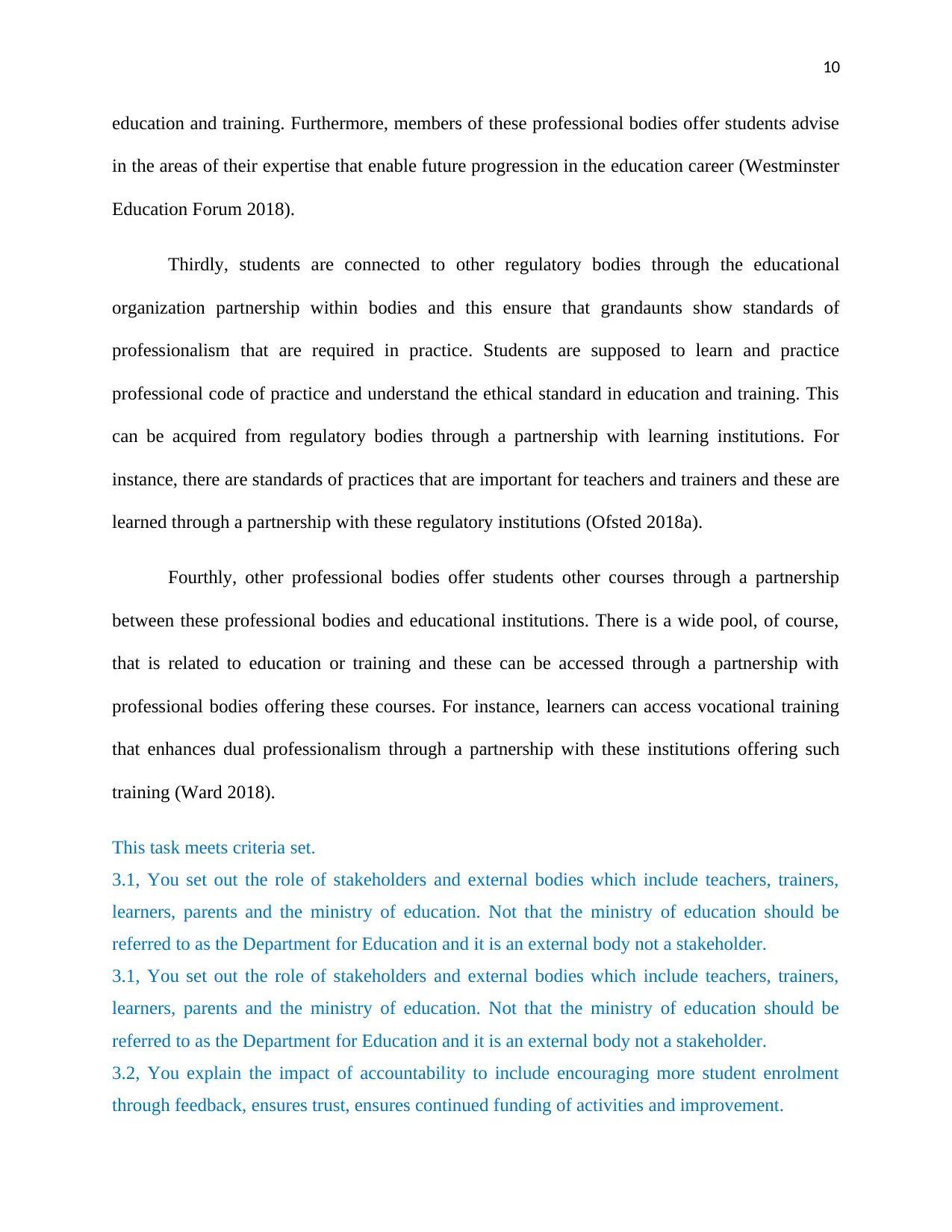
10
education and training. Furthermore, members of these professional bodies offer students advise
in the areas of their expertise that enable future progression in the education career (Westminster
Education Forum 2018).
Thirdly, students are connected to other regulatory bodies through the educational
organization partnership within bodies and this ensure that grandaunts show standards of
professionalism that are required in practice. Students are supposed to learn and practice
professional code of practice and understand the ethical standard in education and training. This
can be acquired from regulatory bodies through a partnership with learning institutions. For
instance, there are standards of practices that are important for teachers and trainers and these are
learned through a partnership with these regulatory institutions (Ofsted 2018a).
Fourthly, other professional bodies offer students other courses through a partnership
between these professional bodies and educational institutions. There is a wide pool, of course,
that is related to education or training and these can be accessed through a partnership with
professional bodies offering these courses. For instance, learners can access vocational training
that enhances dual professionalism through a partnership with these institutions offering such
training (Ward 2018).
This task meets criteria set.
3.1, You set out the role of stakeholders and external bodies which include teachers, trainers,
learners, parents and the ministry of education. Not that the ministry of education should be
referred to as the Department for Education and it is an external body not a stakeholder.
3.1, You set out the role of stakeholders and external bodies which include teachers, trainers,
learners, parents and the ministry of education. Not that the ministry of education should be
referred to as the Department for Education and it is an external body not a stakeholder.
3.2, You explain the impact of accountability to include encouraging more student enrolment
through feedback, ensures trust, ensures continued funding of activities and improvement.
education and training. Furthermore, members of these professional bodies offer students advise
in the areas of their expertise that enable future progression in the education career (Westminster
Education Forum 2018).
Thirdly, students are connected to other regulatory bodies through the educational
organization partnership within bodies and this ensure that grandaunts show standards of
professionalism that are required in practice. Students are supposed to learn and practice
professional code of practice and understand the ethical standard in education and training. This
can be acquired from regulatory bodies through a partnership with learning institutions. For
instance, there are standards of practices that are important for teachers and trainers and these are
learned through a partnership with these regulatory institutions (Ofsted 2018a).
Fourthly, other professional bodies offer students other courses through a partnership
between these professional bodies and educational institutions. There is a wide pool, of course,
that is related to education or training and these can be accessed through a partnership with
professional bodies offering these courses. For instance, learners can access vocational training
that enhances dual professionalism through a partnership with these institutions offering such
training (Ward 2018).
This task meets criteria set.
3.1, You set out the role of stakeholders and external bodies which include teachers, trainers,
learners, parents and the ministry of education. Not that the ministry of education should be
referred to as the Department for Education and it is an external body not a stakeholder.
3.1, You set out the role of stakeholders and external bodies which include teachers, trainers,
learners, parents and the ministry of education. Not that the ministry of education should be
referred to as the Department for Education and it is an external body not a stakeholder.
3.2, You explain the impact of accountability to include encouraging more student enrolment
through feedback, ensures trust, ensures continued funding of activities and improvement.
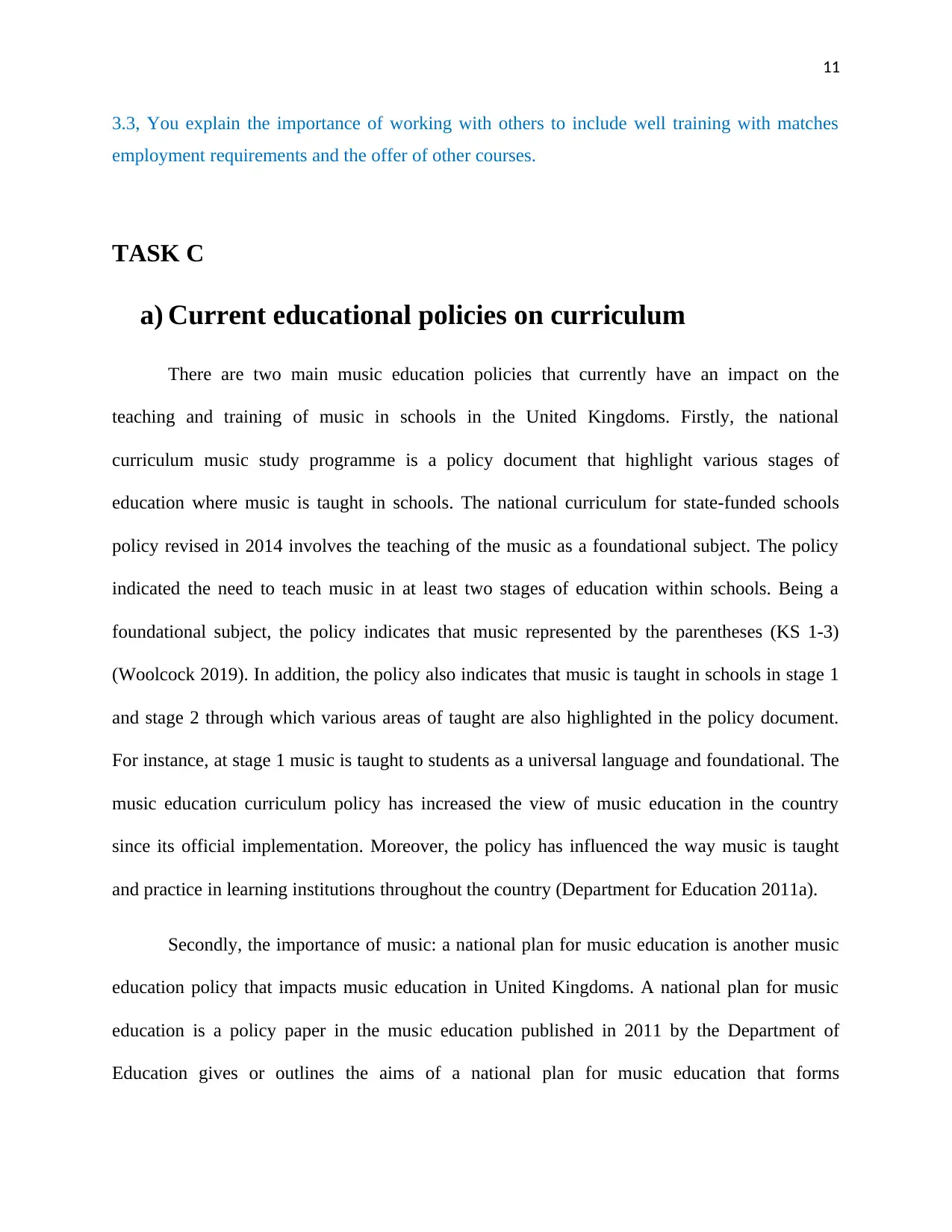
11
3.3, You explain the importance of working with others to include well training with matches
employment requirements and the offer of other courses.
TASK C
a) Current educational policies on curriculum
There are two main music education policies that currently have an impact on the
teaching and training of music in schools in the United Kingdoms. Firstly, the national
curriculum music study programme is a policy document that highlight various stages of
education where music is taught in schools. The national curriculum for state-funded schools
policy revised in 2014 involves the teaching of the music as a foundational subject. The policy
indicated the need to teach music in at least two stages of education within schools. Being a
foundational subject, the policy indicates that music represented by the parentheses (KS 1-3)
(Woolcock 2019). In addition, the policy also indicates that music is taught in schools in stage 1
and stage 2 through which various areas of taught are also highlighted in the policy document.
For instance, at stage 1 music is taught to students as a universal language and foundational. The
music education curriculum policy has increased the view of music education in the country
since its official implementation. Moreover, the policy has influenced the way music is taught
and practice in learning institutions throughout the country (Department for Education 2011a).
Secondly, the importance of music: a national plan for music education is another music
education policy that impacts music education in United Kingdoms. A national plan for music
education is a policy paper in the music education published in 2011 by the Department of
Education gives or outlines the aims of a national plan for music education that forms
3.3, You explain the importance of working with others to include well training with matches
employment requirements and the offer of other courses.
TASK C
a) Current educational policies on curriculum
There are two main music education policies that currently have an impact on the
teaching and training of music in schools in the United Kingdoms. Firstly, the national
curriculum music study programme is a policy document that highlight various stages of
education where music is taught in schools. The national curriculum for state-funded schools
policy revised in 2014 involves the teaching of the music as a foundational subject. The policy
indicated the need to teach music in at least two stages of education within schools. Being a
foundational subject, the policy indicates that music represented by the parentheses (KS 1-3)
(Woolcock 2019). In addition, the policy also indicates that music is taught in schools in stage 1
and stage 2 through which various areas of taught are also highlighted in the policy document.
For instance, at stage 1 music is taught to students as a universal language and foundational. The
music education curriculum policy has increased the view of music education in the country
since its official implementation. Moreover, the policy has influenced the way music is taught
and practice in learning institutions throughout the country (Department for Education 2011a).
Secondly, the importance of music: a national plan for music education is another music
education policy that impacts music education in United Kingdoms. A national plan for music
education is a policy paper in the music education published in 2011 by the Department of
Education gives or outlines the aims of a national plan for music education that forms
⊘ This is a preview!⊘
Do you want full access?
Subscribe today to unlock all pages.

Trusted by 1+ million students worldwide
1 out of 23
Related Documents
Your All-in-One AI-Powered Toolkit for Academic Success.
+13062052269
info@desklib.com
Available 24*7 on WhatsApp / Email
![[object Object]](/_next/static/media/star-bottom.7253800d.svg)
Unlock your academic potential
Copyright © 2020–2026 A2Z Services. All Rights Reserved. Developed and managed by ZUCOL.





